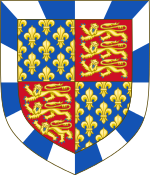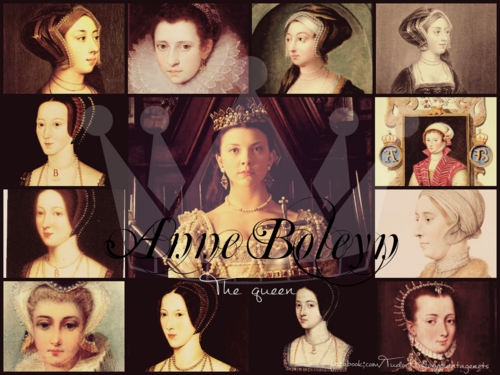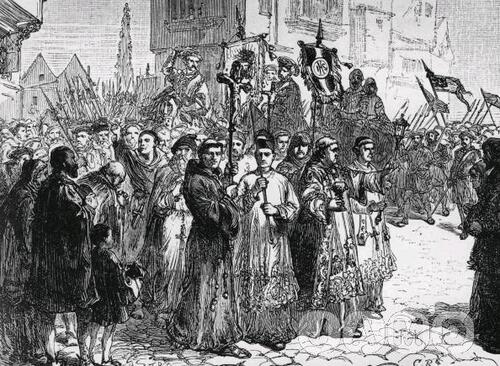-
Today in Tudor History...
15 May 1464-Execution of Henry Beaufort, 3rd Duke of Somerset.He was an important Lancastrian military commander during the English Wars of the Roses. He is sometimes numbered the 2nd Duke of Somerset, since the title was re-created for his father after his uncle died. He also held the subsidiary titles of 5th Earl of Somerset, 2nd Marquess of Dorset and 2nd Earl of Dorset.

15 May 1536

Trial of Anne Boleyn and Lord Rocheford
Record of pleas held at the Tower of London before Thos. duke of Norfolk, treasurer and earl marshal, lord high steward, citing:—
(1.) Patent appointing the said Duke steward of England hac vice for the trial of queen Anne and lord Rocheford. Westm., 12 May 28 Hen. VIII.
(2.) Mandate to Sir John Baldewyn, Sir Ric. Lister, Sir John Porte, Sir John Spelman, Sir Walter Luke, Sir Anth. Fitzherbert, Sir Thos. Englefeld, and Sir Will. Shelley, special commissioners of Oyer and Terminer for Middlesex, to return all indictments found against queen Anne and lord Rocheford. Westm., 13 May 28 Hen. VIII.
(3.) Similar mandate to Sir John Baldewyn, Sir Walter Luke, Sir Anth. Fitzherbert, and Sir Will. Shelley, special commissioners for Kent. Westm., 13 May 28 Hen. VIII.
(4.) Mandate to Sir Will. Kyngestone, constable of the Tower, to bring queen Anne and lord Rocheford before the Lord High Steward when required. Westm., 13 May 28 Hen. VIII.
(5.) The Lord High Steward issued his precept, 13 May, to Sir John Baldewyn and his fellows in Middlesex, to return the indictments at the Tower before him on Monday, 15 May, and a similar precept to Sir J. Baldewyn, Luke, and his fellows in Kent; a third precept to the constable of the Tower to bring queen Anne and lord Rocheford that day before him; and a fourth to Ralph Felmyngham, serjeant-at-arms, to summon such and so many lords of the kingdom, peers of the said queen Anne and lord Rocheford, by whom the truth may appear.
(6.) Pleas held before the duke of Norfolk, steward of England, at the Tower, on Monday, 15 May 28 Hen. VIII.
The justices bring in the indictments for Middlesex and Kent, Sir Will. Kingston produces the prisoners, and Ralph Felmyngham declares that he has summoned the peers. Proclamation being then made, the peers answer to their names; viz., Charles duke of Suffolk, Hen. marquis of Exeter, Will. earl of Arundel, John earl of Oxford, Hen. earl of Northumberland, Ralph earl of Westmoreland, Edw. earl of Derby, Hen. earl of Worcester, Thos. earl of Rutland, Rob. earl of Sussex, Geo. earl of Huntingdon, John lord Audeley, Thos. lord La Ware, Hen. lord Mountague, Hen. lord Morley, Thos. lord Dacre, Geo. lord Cobham, Hen. lord Maltravers, Edw. lord Powes, Thos. lord Mount Egle, Edw. lord Clynton, Will. lord Sandes, Andrew lord Wyndesore, Thos. lord Wentworth, Thos. lord Burgh, and John lord Mordaunt.
(7.) Indictment found at Westminster on Wednesday next after three weeks of Easter, 28 Hen. VIII. before Sir John Baldwin, &c., by the oaths of Giles Heron, Roger More, Ric. Awnsham, Thos. Byllyngton, Gregory Lovell, Jo. Worsop, Will. Goddard, Will. Blakwall, Jo. Wylford, Will. Berd, Hen. Hubbylthorn, Will. Hunyng, Rob. Walys, John England, Hen. Lodysman, and John Averey; who present that whereas queen Anne has been the wife of Henry VIII. for three years and more, she, despising her marriage, and entertaining malice against the King, and following daily her frail and carnal lust, did falsely and traitorously procure by base conversations and kisses, touchings, gifts, and other infamous incitations, divers of the King's daily and familiar servants to be her adulterers and concubines, so that several of the King's servants yielded to her vile provocations; viz., on 6th Oct. 25 Hen. VIII., at Westminster, and divers days before and after, she procured, by sweet words, kisses, touches, and otherwise, Hen. Noreys, of Westminster, gentle man of the privy chamber, to violate her, by reason whereof he did so at Westminster on the 12th Oct. 25 Hen. VIII.; and they had illicit intercourse at various other times, both before and after, sometimes by his procurement, and sometimes by that of the Queen. Also the Queen, 2 Nov. 27 Hen. VIII. and several times before and after, at Westminster, procured and incited her own natural brother, Geo. Boleyn, lord Rocheford, gentleman of the privy chamber, to violate her, alluring him with her tongue in the said George's mouth, and the said George's tongue in hers, and also with kisses, presents, and jewels; whereby he, despising the commands of God, and all human laws, 5 Nov. 27 Hen. VIII., violated and carnally knew the said Queen, his own sister, at Westminster; which he also did on divers other days before and after at the same place, sometimes by his own procurement and sometimes by the Queen's. Also the Queen, 3 Dec. 25 Hen. VIII., and divers days before and after, at Westminster, procured one Will. Bryerton, late of Westminster, gentleman of the privy chamber, to violate her, whereby he did so on 8 Dec. 25 Hen. VIII., at Hampton Court, in the parish of Lytel Hampton, and on several other days before and after, sometimes by his own procurement and sometimes by the Queen's. Also the Queen, 8 May 26 Hen. VIII., and at other times before and since, procured Sir Fras. Weston, of Westminster, gentleman of the privy chamber, &c., whereby he did so on the 20 May, &c. Also the Queen, 12 April 26 Hen. VIII., and divers days before and since, at Westminster, procured Mark Smeton, groom of the privy chamber, to violate her, whereby he did so at Westminster, 26 April 27 Hen. VIII.
Moreover, the said lord Rocheford, Norreys, Bryerton, Weston, and Smeton, being thus inflamed with carnal love of the Queen, and having become very jealous of each other, gave her secret gifts and pledges while carrying on this illicit intercourse; and the Queen, on her part, could not endure any of them to converse with any other woman, without showing great displeasure; and on the 27 Nov. 27 Hen. VIII., and other days before and after, at Westminster, she gave them great gifts to encourage them in their crimes. And further the said Queen and these other traitors, 31 Oct. 27 Hen. VIII., at Westminster, conspired the death and destruction of the King, the Queen often saying she would marry one of them as soon as the King died, and affirming that she would never love the King in her heart. And the King having a short time since become aware of the said abominable crimes and treasons against himself, took such inward displeasure and heaviness, especially from his said Queen's malice and adultery, that certain harms and perils have befallen his royal body.
And thus the said Queen and the other traitors aforesaid have committed their treasons in contempt of the Crown, and of the issue and heirs of the said King and Queen.
(8.) Record of indictment and process before Baldewyn, Luke, and others, in co. Kent.
The indictment found at Deptford, on Thursday, 11 May 28 Hen. VIII., is precisely similar in character to the Middlesex indictment, except as regards times and places; viz., that the Queen at Estgrenewyche, 12 Nov. 25 Hen. VIII., and divers days before and since, allured one Hen. Noreys, late of Est Grenewyche, to violate her, whereby he did so on the 19 Nov., &c.; that on 22 Dec. 27 Hen. VIII., and divers other days, at Eltham, she allured Geo. Boleyn, lord Rocheford, &c., whereby he did so, 29 Dec., &c.; that on the 16 Nov. 25 Hen. VIII., and divers, &c., at Est Grenewyche, she allured one Will. Bryerton, late of Est Grenewyche, &c., whereby he did so, 27 Nov., &c.; that on the 6 June 26 Hen. VIII., &c., at Est Grenewyche, she allured Sir Fras. Weston, &c., whereby he did so, 20 June, &c.; that on the 13 May 26 Hen. VIII. &c., at Est Grenewyche, she allured Mark Smeton, &c., whereby he did so, 19 May 26 Hen. VIII.
And further that the said Boleyn, &c. grew jealous of each other; and the Queen, to encourage them, at Eltham, 31 Dec. 27 Hen. VIII., and divers times before and since, made them presents, &c.; that the Queen and the others, 8 Jan. 27 Hen. VIII., conspired the King's death, &c., and that she promised to marry one of the traitors whenever the King was dead, affirming she would never love him, &c.
And afterwards, Monday, 15 May, queen Anne comes to the bar before the Lord High Steward in the Tower, in the custody of Sir Will. Kingston, pleads not guilty, and puts herself on her peers; whereupon the said duke of Suffolk, marquis of Exeter, and other peers, are charged by the High Steward to say the truth; and being examined from the lowest peer to the highest, each of them severally saith that she is guilty.
Judgment:—To be taken to prison in the Tower, and then, at the King's command, to the Green within the Tower, and there to be burned or beheaded as shall please the King.
The same day, lord Rocheford is brought before the High Steward in the custody of Sir Will. Kingston, and pleads not guilty. The peers are charged, with the exception of the earl of Northumberland, who was suddenly taken ill, and each of them severally saith that he is guilty.
Judgment:—To be taken to prison in the Tower, and then drawn through the city of London, to the gallows at Tyburn, &c., as usual in high treason.

Original parchment record of the trial of Anne Boleyn and her brother, George Boleyn
Anne and George Boleyn were tried separately in the Tower of London.The Duke of Norfolk, pronounced the sentence:
“Because thou hast offended against our sovereign the King’s Grace in committing treason against his person, and here attainted of the same, the law of the realm is this, that thou hast deserved death, and thy judgment is tis: that thou shalt be burned here within the Tower of London on the Green, else to have thy head smitten off, as the King’s pleasure shall be further known of the same.”
She was accused of adultery, incest, and high treason.By the Treason Act of Edward III, adultery on the part of a queen was a form of treason (presumably because of the implications for the succession to the throne) for which the penalty was hanging, drawing and quartering for a man and burning alive for a woman, but the accusations, and especially that of incestuous adultery, were also designed to impugn her moral character. The other form of treason alleged against her was that of plotting the king's death, with her "lovers", so that she might later marry Henry Norris.Henry Percy, 6th Earl of Northumberland sat on the jury that found Anne guilty. When the verdict was announced, he collapsed and had to be carried from the courtroom.
After Anne received the sentence , she addressed the court:
“My lords, I will not say your sentence is unjust, nor presume that my reasons can prevail against your convictions. I am willing to believe that you have sufficient reasons for what you have done; but then they must be other than those which have been produced in court, for I am clear of all the offences which you then laid to my charge. I have ever been a faithful wife to the King, though I do not say I have always shown him that humility which his goodness to me, and the honours to which he raised me, merited. I confess I have had jealous fancies and suspicions of him, which I had not discretion enough, and wisdom, to conceal at all times. But God knows, and is my witness, that I have not sinned against him in any other way. Think not I say this in the hope to prolong my life, for He who saveth from death hath taught me how to die, and He will strengthen my faith. Think not, however, that I am so bewildered in my mind as not to lay the honour of my chastity to heart now in mine extremity, when I have maintained it all my life long, much as ever queen did. I know these, my last words, will avail me nothing but for the justification of my chastity and honour. As for my brother and those others who are unjustly condemned, I would willingly suffer many deaths to deliver them, but since I see it so pleases the King, I shall willingly accompany them in death, with this assurance, that I shall lead an endless life with them in peace and joy, where I will pray to God for the King and for you, my lords.”
George stood trial a few hours after Anne . As Anne had been found guilty before George had stood trial he too was pre-judged because he could hardly be acquitted when his sister had already been found guilty of incest. The order of the trials had been very cleverly arranged to ensure the difficult case against George could not realistically fail
Cranmer declared Anne's marriage to Henry null and void

Charles V. to Chapuys.
We send with this other letters of ours, written for the purpose of being shown to Cromwell and the Council, and even to the King if you think fit, but you must not deliver a copy or let them out of your hands. In them we refer to our previous letters, in order that you may add or diminish as the state of matters requires. If the King consent to treat we wish you to follow substantially our previous letters, and, if there be any difficulty and you cannot do better, you are to temporise, either on the pretext of communicating with us, or otherwise, so that the King may not directly or indirectly assist France, without further pretending to the king of England that Francis can be induced to forbear from war for any reason but want of power, and we trust we are strong enough to withstand him. Moreover, we think that in this the king of England would think he had done much for us, and would become more intractable in other matters.
Hannaert has written to Granvelle on the 9th that he had just heard that the king of England's concubine had been surprised in bed with the King's organist. If this be so, as it is very probable that God has permitted it after her damnable life, we think the King will be more inclined to treat, especially as regards our cousin; but you must use great dexterity lest the King intend a marriage in France, and that he should rather choose one of his own subjects, either the one with whom he is in love or some other. We trust that if there be anything in it you will let us know with diligence. We send letters of credence for you for the dukes of Richmond, Norfolk, and Suffolk, and also for Cromwell, such as you will see by the copies. Pontremulo, 15 May 1536.
P.S.—Since the above was written your man George has arrived, who confirms the news touching the King's concubine, and, as we suppose that the King will put her and her accomplices to death and take another wife, as he is of amorous complexion and always desires to have a male child, and as on the side of France they will not fail to offer him a match, you will suggest, when you can, to him or Cromwell, a marriage with the Infanta of Portugal, daughter of our sister the queen of France, who has 400,000 ducats dowry by testament. Another marriage might be arranged for the Infant Don Loys of Portugal, our brother-in-law, with the princess of England. You must point out to them that these matches would be very expedient, both to remove past scruples and to promote strict amity between us, him, and Portugal, and would be very advantageous to England in case the King should have a male child by this marriage, as he may reasonably hope from the youth and bringing up of the Infanta. If you see the King not inclined to these marriages you might propose one between the King and our niece, the duchess dowager of Milan, a beautiful young lady, well brought up and with a good dowry; treating at the same time of the other marriage between Don Loys and our cousin. But we should greatly prefer the former match with the Infanta, for the good of both, and in order to be able to dispose of our niece of Milan otherwise. Bersel, 15 May 1536.

15 May 1537 – Thomas Darcy, 1st Baron Darcy de Darcy, and John Hussey, 1st Baron Hussey of Sleaford, were tried for treason at Westminster after being implicated in the Pilgrimage of Grace.

15 may 1556-John Knox, the Scottish Reformer, appeared in Edinburgh to face heresy charges.
15 May 1567 - Marriage of Mary Stuart and James Hepburn, Earl of Bothwell

source:wikipedia,http://www.onthisdayintudorhistory.com/,http://www.british-history.ac.uk/,http://queentohistory.blogspot.fr/,facebook.com/theanneboleynfiles
 Tags : tudor, anne boleyn, george boleyn, charles V, chapuys, trial, henry VIII
Tags : tudor, anne boleyn, george boleyn, charles V, chapuys, trial, henry VIII
-
Commentaires
Aucun commentaire pour le moment Suivre le flux RSS des commentaires
Suivre le flux RSS des commentaires
Vous devez être connecté pour commenter
